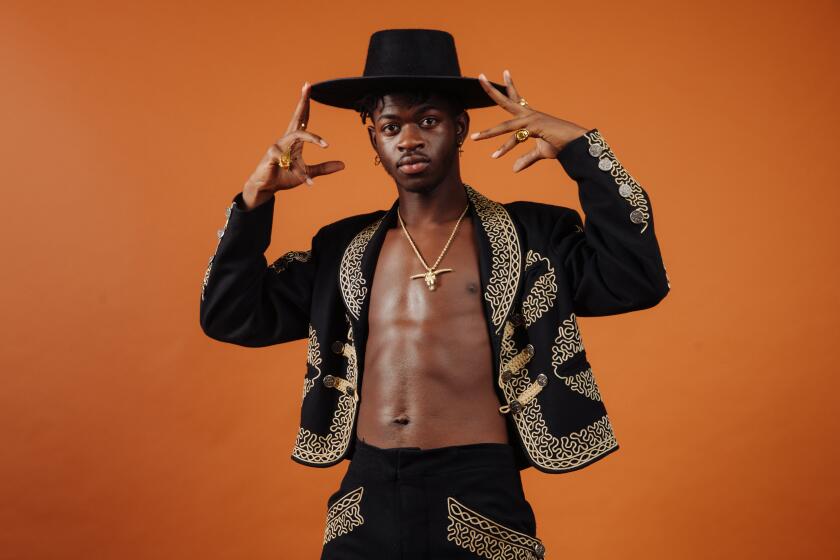Activists take on culture’s anti-gay lyrics
- Share via
For evidence that Jamaican dancehall culture has trickled well into the mainstream, look no further than the recent MTV Video Music Awards.
Dancehall act Elephant Man was a nominee; Missy Elliott sported a hat designed by Dior Rasta, a high-end clothing line branded by Rastafarian colors; and Fat Joe and the Terror Squad performed their hit “Lean Back,” a homage to a Jamaican dance move.
Popularity, though, comes with a price: increased attention. In recent months, dancehall lyrics, once overlooked by or indecipherable to mainstream audiences, have been subjected to scrutiny. And while most stand up to it, some lyrics expose an ugly theme with a notorious history in dancehall: virulent homophobia.
Citing Beenie Man, Buju Banton, Elephant Man, Vybz Kartel and four other dancehall acts with songs that describe acts of violence against “batty men” (slang for homosexuals), the British gay rights group OutRage! has led a heated campaign against this strain of reggae, which it calls “murder music.”
The campaign continues to hit Jamaican artists where it hurts. Elephant Man and Kartel were dumped from Britain’s prestigious Music of Black Origin awards this month. MTV dropped Beenie Man from a Video Music Awards-related event and the R.J. Reynolds Tobacco Co. axed him from a tour it was sponsoring. And a sizable London reggae festival was canceled recently after potential venues felt heat from protesters.
“Their future is in their hands,” OutRage! campaigner Peter Tatchell said in a phone interview from London. “We don’t want to damage their careers, but if [artists] are unwilling to cease their glorification of violence against gays and lesbians, we will continue to campaign against them.”
OutRage! -- whose campaign against anti-gay dancehall lyrics was launched a decade ago, when the genre made its first foray into the mainstream -- takes partial credit for the loss of career momentum suffered by onetime Jamaican crossover act Shabba Ranks.
In 1992, Ranks defended the first high-profile anti-gay anthem, Banton’s “Boom Bye Bye,” by reading from his Bible during a television appearance. OutRage! prompted England’s Radio 1 to pull Ranks’ music off the airwaves.
Anti-gay sentiment in Jamaica -- where laws deem “the abominable crime of buggery” punishable by as long as 10 years in prison -- is partly a product of “the same fundamentalist Christian ethic found in many other parts of the world,” says Carolyn Cooper, professor of literature and cultural studies at Jamaica’s University of the West Indies and author of “Soundclash: Jamaican Dancehall Culture at Large.” The biblical story of Sodom and Gomorrah is often cited by anti-gay artists, she adds.
Well before Bob Marley, the Rastafarian religion lent reggae its biblical overtones, and it’s worth noting that the Bible doles out wrath and serenity in equal measure.
Eminem and other hip-hop artists have earned slaps on the wrist for their bouts of misogyny and homophobia, but the fact that reggae, unlike hip-hop, was founded on a spiritual, socially conscious platform makes it subject to high standards.
According to Dr. Robert Carr, executive director of the organization Jamaica AIDS Support, dancehall’s anti-gay ethos is also based on “a secular idea that manliness is violent. It’s a very cold, very macho, very brutal world in these lyrics.”
Carr claims that artists are under “peer pressure to release these kinds of [homophobic] songs,” but underscores that they reflect just a small part of the music. “It is frustrating to see all of reggae being painted with the same brush, because there are tremendous musicians in the genre.”
Tanya Stephens, a popular dancehall act who refers to homophobic rhetoric as “stupidness,” asserts that “this [anti-gay] point of view does not represent the wider Jamaica.”
Dancehall artists have in the past attempted to explain away anti-gay lyrics as larger-than-life metaphors for corruption and for the forces of “Babylon” -- impure foreign society. A recent case, however, blurs the line between literal and metaphorical: Six gay men who were attacked in Kingston in June allege that among their attackers was Rastafarian reggae star Banton, a musician who has evolved into a profound lyricist known as “the voice of Jamaica.”
The superintendent of Kingston’s Constant Spring Police said in an interview that a warrant has been issued for Banton’s arrest when he returns to the country from a tour in Europe. A spokeswoman for Banton’s Gargamel Music label denies the charges, saying, “Buju is an artist. Not a pugilist. He simply wasn’t involved.”
Tatchell, furious about the Banton case, has spelled out his demands: Reggae record companies must buy up existing stock of and rights to all anti-gay dancehall tracks, and artists must deliver videotaped apologies. Written apologies, he said, are unacceptable because artists -- including Beenie Man, who put one out last month via his label -- have disavowed them upon returning to Jamaica.
Kartel made an apology on British radio earlier this month that landed him on the front page of Jamaican tabloids, which mocked him mercilessly for “bowing” (patois slang for oral sex, another Jamaican taboo). The media’s role in adding fuel to the fire -- Jamaican tabloids similarly lampooned Beenie Man following his apology -- suggests that the burden for reform ought not fall squarely on the shoulders of entertainers.
And because reggae’s anti-gay rhetoric is a small but vile addendum to the broader strokes of its artistry, eradicating such rhetoric would improve the music morally and aesthetically. Stale hate speech, after all, suggests creative poverty. And talented Jamaican artists have never been famous for that.
More to Read
The biggest entertainment stories
Get our big stories about Hollywood, film, television, music, arts, culture and more right in your inbox as soon as they publish.
You may occasionally receive promotional content from the Los Angeles Times.









